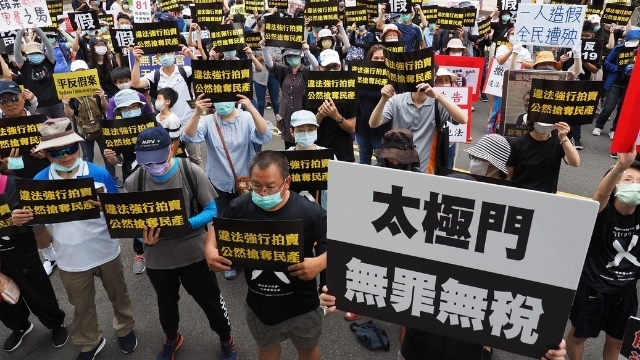The Russian experience may serve as a cautionary tale for what is now happening in Taiwan.
by Boris Falikov

The action of Taiwan’s National Tax Bureau, which spent two dozen years on a taxation case against the qigong school Tai Ji Men, reminds me of a play by Eugène Ionesco, one of the masters of the theatre of absurd. Usually, such things are shown on scene as parables of gross injustice but sometimes they do happen in real life, as in the case we reflect upon. The victims of this injustice are dizis of Tai Ji Men Qigong Academy, which is very popular not only in Taiwan but everywhere in the world.
Qigong is based on esoteric Taoism, but Tai Ji Men has a very wide cultural program, and is tolerant of different religious worldviews. This approach lets Tai Ji Men carry on a successful international activity, and found academies in various countries. It also participates in the world peace movement. This multifaceted activity makes it easy for a foreigner like myself to share the values of Tai Ji Men, and to support it in its plight when a blind bureaucratic machine has been persecuting it for almost a quarter of a century.
It is very gruesome that such an internationally renowned movement used to be persecuted in Taiwan as an “evil cult.” Now its name is cleared of most accusations but some of the false tax evasion accusations still linger. They are like a bad dream one wants immediately to escape. But this bad dream boorishly intrudes on real life, if we consider that, in August of last year, the National Tax Bureau seized and auctioned properties of Dr. Hong, the founder and spiritual leader of the Tai Ji Men Qigong Academy.
In Russia it is even easier to understand this sad case of persecution. Religious and spiritual minorities have a difficult life in my country. The anticult movement is on the rise, and closely connected with law enforcement agencies (siloviki in Russian). Anticult leaders like Alexander Dvorkin, affiliated with the Russian Orthodox Church, managed to convince the Russian authorities that new religious movements are a real threat not only to the Church but also to the State itself. That is why all means are good to make their life miserable. Unjust taxation is one of them.

The Russian Orthodox Church and other so called “traditional” religious organizations are tax-exempt but the new religious movements were often charged with tax evasion, as their religious rituals were considered secular products and were submitted to heavy taxation. For example, arguments of Russian vaishnavas that producing prasadam (food devoted to Krishna) was a religious activity and not to be taxed were ignored. Accusations against Scientology of tax evasion were a common thing.
However, when I started to monitor the present-day situation of taxation of religious minorities in Russia for this article, I was surprised to see that tax evasion accusations against new religious movements became rare. The last one happened in 2019, when the St. Petersburg Church of Scientology was accused of it. But, alas, I had no time for a sigh of relief. I have discovered immediately that persecutions became even harder, with more ruthless instruments used.
The major weapon for fighting new religious movements in Russia now is a new law on religious extremism. Based on this law, the Jehovah’s Witnesses were banned in Russia to the dismay of the whole world. Now Jehovah’s Witnesses and Scientologists are not only fined for tax evasion but put into prisons for religious extremism. Of course, there is a certain logical contradiction in it. First, siloviki try to deprive new religious movements of their religious status, and compel them to pay taxes for what are in fact their religious activities, but then they accuse them of religious extremism. But logic was never a strong side of Russian siloviki, and I am afraid of law enforcement agencies in general. Their target is to destroy what they consider to be an enemy of the State by any means, and they do not need logic for it but brutal force.
My words may sound like a consolation to the persecuted members of Tai Ji Men: don’t worry, things are much worse in Russia. It is not even necessary to go as far as Russia, in neighbouring Communist China things are even worse. But such comparison would be a wrong reason for consolation. What I mean is rather a warning.
My warning is based on the recent history of Russia. The situation with new religious movements in Russia was getting worse during the last thirty years. In 1992, the Communist regime fell down, and religious freedom came to a country where the policy of State atheism had been forced upon the population for 75 years. The new democratic Constitution was introduced in 1993, with clauses on separation of State and Church and freedom of conscience and of religion.
Then, things started to change for the worse. In 1997, an amendment to the law on religion was approved, which introduced the idea of traditional and non-traditional religions. The new religious movements, which were new arrivals, got into the latter category, and started to come across certain difficulties. The religious experts like myself understood the danger of such religious inequality, and started to fight against it, but the new democratic State decided to favour the majority religions like the Russian Orthodox Church to improve its electoral base. By the beginning of the next decade, persecutions of new religious movements became stronger, which was quite expected. The anticult movement started to gain ground, and its leaders made friends with law enforcement agencies.
As Vladimir Putin came to power, the trend toward authoritarian rule began to increase, and persecution of religious minorities became an inevitable part of it. The liberal opposition to Putin’s regime tried to stop this trend but liberals didn’t pay much attention to religious persecutions considering it a minor issue. They mostly had a secular mentality and new religious movements for them were non-important minorities with bizarre worldviews. But by today the liberal opposition itself became an almost non-existent minority, and their mentality looks to the pro-Putin’s majority as bizarre as the views of Hare Krishnas once looked to them.
This is why the fight for religious freedom for minorities is so important for democracy. If minorities lose their freedom, the society at large risks losing it too. This sad logic is demonstrated by the example of Russia but it’s a valid warning to democratic countries too. Taiwan is a democratic country, and is moving in the political direction opposite to that of Russia. But we know that the road to progress is a bumpy one. It looks like there are still some vestiges of authoritarian tendencies in some Taiwanese social institutions. The National Tax Bureau in the Tai Ji Men case is a good example of it. Fighting these tendencies is very important.

That is why I think that the staunch opposition of Tai Ji Men to the false accusation of tax evasion, and the fact that they fight against it for almost a quarter of a century, play a great role for the democratic climate in Taiwan. If people are not aware of such injustice, things might change for the worse. It looks like it started to happen in Taiwan already. First, one is made to pay unjust taxes, then one’s property is confiscated as in the case of Dr. Hong. Next, one might be accused of religious extremism. It’s exactly what happened in Russia. I would not like it to happen in Taiwan.*
*A paper presented at the international webinar “Education, Conscience, and Tax Justice: Reflecting on the Tai Ji Men Tax Case in Taiwan,” January 24, 2021.
Source: Bitter Winter
